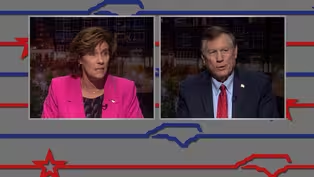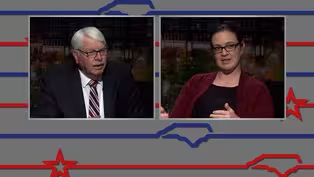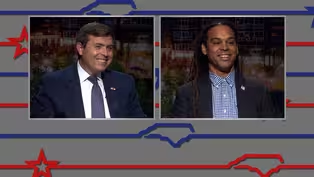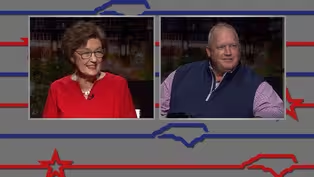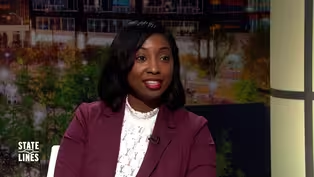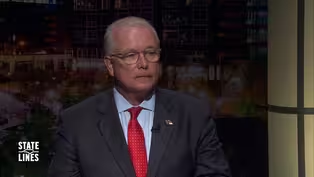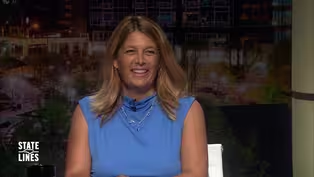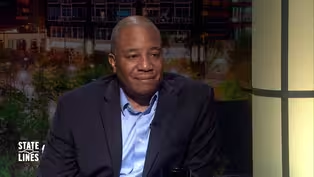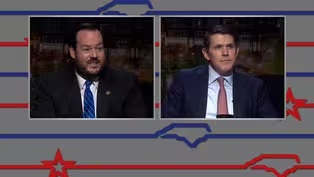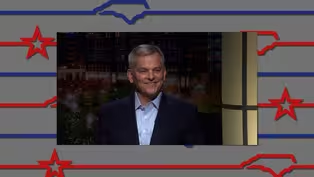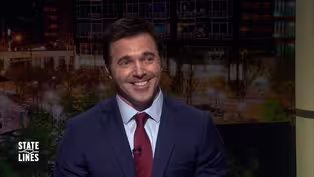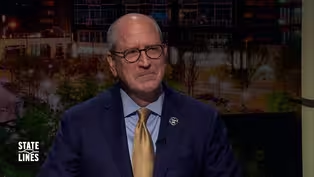
2024 NC Lieutenant Governor Candidates
Special | 26m 46sVideo has Closed Captions
Hal Weatherman (R) and Rachel Hunt (D) discuss their campaigns for NC Lieutenant Governor.
Candidates Hal Weatherman (Republican) and Rachel Hunt (Democrat) discuss their campaigns for NC Lieutenant Governor. Hosted by PBS NC’s Kelly McCullen, these interviews were recorded on July 23 and July 24, 2024.
Problems playing video? | Closed Captioning Feedback
Problems playing video? | Closed Captioning Feedback
State Lines is a local public television program presented by PBS NC

2024 NC Lieutenant Governor Candidates
Special | 26m 46sVideo has Closed Captions
Candidates Hal Weatherman (Republican) and Rachel Hunt (Democrat) discuss their campaigns for NC Lieutenant Governor. Hosted by PBS NC’s Kelly McCullen, these interviews were recorded on July 23 and July 24, 2024.
Problems playing video? | Closed Captioning Feedback
How to Watch State Lines
State Lines is available to stream on pbs.org and the free PBS App, available on iPhone, Apple TV, Android TV, Android smartphones, Amazon Fire TV, Amazon Fire Tablet, Roku, Samsung Smart TV, and Vizio.
Providing Support for PBS.org
Learn Moreabout PBS online sponsorshipMore from This Collection
During major election cycles, PBS North Carolina's public affairs team sits down for in-depth conversations with candidates running for Governor and Council of State positions. PBS North Carolina has invited major party candidates to a one-on-one interview with State Lines host and executive producer Kelly McCullen. Interviews are scheduled throughout the summer.
2024 NC Commissioner of Insurance Candidates
Video has Closed Captions
Mike Causey (R) and Natasha Marcus (D) discuss their campaigns for NC Commissioner of Insurance. (26m 46s)
2024 NC Commissioner of Agriculture Candidates
Video has Closed Captions
Sarah Taber (D) and Steve Troxler (R) discuss their campaigns for NC Commissioner of Agriculture. (26m 46s)
2024 NC Commissioner of Labor Candidates
Video has Closed Captions
Luke Farley (R) and Braxton Winston II (D) discuss their campaigns for NC Commissioner of Labor. (26m 46s)
2024 NC Secretary of State Candidates
Video has Closed Captions
Elaine Marshall (D) and Chad Brown (R) discuss their campaigns for NC Secretary of State. (26m 46s)
Jessica Holmes, Democratic Candidate for NC Auditor
Video has Closed Captions
An interview with Jessica Holmes, Democratic candidate for NC Auditor (2024). (12m 32s)
Dave Boliek, Republican Candidate for NC Auditor
Video has Closed Captions
An interview with Dave Boliek, Republican candidate for NC Auditor (2024). (12m 58s)
Michele Morrow, Republican Candidate for NC Superintendent of Public Instruction
Video has Closed Captions
An interview with Michele Morrow, GOP candidate for NC Superintendent of Public Instruction (2024). (12m 57s)
Maurice "Mo" Green, Democratic Candidate for NC Superintendent of Public Instruction
Video has Closed Captions
An interview with Mo Green, Democratic candidate for NC Superintendent of Public Instruction (2024). (13m 7s)
Video has Closed Captions
Wesley Harris (D) and Brad Briner (R) discuss their campaigns for NC Treasurer. (26m 46s)
Video has Closed Captions
Josh Stein (D) discusses his campaign for NC Governor. (26m 46s)
Jeff Jackson, Democratic Candidate for NC Attorney General
Video has Closed Captions
An interview with Jeff Jackson, Democratic candidate for NC Attorney General (2024). (12m 50s)
Dan Bishop, Republican Candidate for NC Attorney General
Video has Closed Captions
An interview with Dan Bishop, Republican candidate for NC Attorney General (2024). (12m 44s)
Providing Support for PBS.org
Learn Moreabout PBS online sponsorship- Meet the Republican and Democratic nominees for North Carolina lieutenant governor on this special election 2024 edition of "State Lines".
[grand music] Hi there, I'm Kelly McCullen.
This "State Lines" special will introduce us to the candidates for North Carolina lieutenant governor.
Some facts about the lieutenant governor in our state.
It was a position created back in 1868.
Lieutenant governors provide over the daily sessions of the state Senate and our limited to two four-year terms.
Joining me now is the GOP nominee for lieutenant governor of North Carolina, Hal Weatherman.
Hal, good to see you on this show.
Thanks for taking time off the campaign trail for conversation.
- Thanks for having me.
- We've done this with you as a campaign advisor/manager and now as a candidate, but this state's a lot different and a lot larger.
Who's Hal Weatherman?
- Hal Weatherman is 54 years old, been married for 20 years to my wife Shelly.
We have three kids, all teenagers.
One's in college, two are in the home.
We live in Wake Forest, North Carolina.
I'm the former chief of staff to the previous lieutenant governor, Dan Forest, and the previous chief of staff to his mother, Sue Myrick, retired member of Congress.
First female mayor of the City of Charlotte, and 18 years in Congress and I was with her for all 18 years.
- And a Republican mayor of Charlotte, much like Pat McCrory.
But you know, the state's changing politically.
How is it different in this as you've traveled this state and how has it changed over the years since you were able to elect a Republican as mayor of Charlotte?
- I mean, the influx of, you know, out-of-staters is fairly significant, especially the more urban you go.
The rural areas are shrinking, by and large, and the urban areas getting larger, and to be specific, Raleigh and Charlotte are getting larger and it's bringing a new influx of people.
A lot of 'em from the Northeast, a lot of 'em younger and even among the Republican party, there's a significant amount of Republicans coming in, but it's a different breed of Republican than the old-school, traditional Southern Republicans.
Same thing with the Democrats.
And I think that's what's actually fueling the rise of unaffiliateds increasing as a percentage of the voter registrants.
It's really out-of-staters coming in with no loyalty to one party or the other.
- Is it healthy for most voters statistically to not have a loyalty to one party or the other?
It's one thing to be in camp Weatherman or camp Hunt or camp Cooper or camp McCrory.
What's healthy for our society?
- I mean, you know, I don't know if it's healthy or unhealthy, I just think it is the way it is, is, you know, parties used to wield great influence in politics and really with the change of campaign finance laws maybe 20 years ago, McCain-Feingold, he who has gold make the rules, and the party influence waned because the candidates started really raising more money than the parties did at the county level and even at the state level.
And so really that's what's fueled the change as far as I'm concerned, is it's just the decline of the old-school party.
I mean, you used to have ward bosses and party bosses and those days are long gone.
Candidates run their own campaign, they have their own staff, they're not necessarily dependent on their parties, but still, you have an advantage.
You still have an advantage if you're a member of one party or the other, only because you have a primary system that gets your name out there, you have the infrastructure of the party itself broken all the way down to the county level.
And so it's a disadvantage as an unaffiliate as a candidate.
But yeah.
- Let's talk about this lieutenant governor's race.
What's your approach to elevating this position?
It's technically the number two highest position in North Carolina politics.
I think legislators have peeled back power and influence.
Maybe not influence, but certainly the tactical legislative power.
How have you elevated this role and your own identity during the '24 cycle?
- I mean, I followed the lead of the office.
The office, you know, if I win, I'll serve on the State Board of Education.
If I win, I'll serve on the State Board of Community Colleges and I'm very interested in those positions because of what it'll allow me to do.
You know, I wanna bring a new generation of people into the trades.
I go all around the state and I talk about we've lost as a society what I call the basic concept of the dignity of work itself.
And so I wanna drive, you know, I tell young people today that the quickest way to make six figures, the quickest way to be your own boss, the quickest way to build a business that you can literally sell for seven plus figures and retire is to work with your hands.
And so I actually like the assignments that the lieutenant governor has, 'cause those two pedestals of the Board of Education and the Board of Community Colleges would allow me to drive a new generation.
I've got several ideas to drive a new generation of people into working with your hands and removing that stigma we put on people who work with their hands.
- But if you're on that committee or that board, you're just one of many on that board as a standalone lieutenant governor out on the stop, eating 100 pounds of barbecue and 58 dozen fried fish- - Rubber chickens, yeah.
- Dignity of work, we're gonna hear that out of you on the trail and, if you're elected, in office.
I mean, what does that mean?
I can surmise what it means, but in your opinion.
- So I'd like to create a what I just call right now a two-and-two degree.
It's a new degree for kids who are gonna go to college.
I'd like 'em to go to the first two years if they want to a trade school, one of the 58 community colleges, get their certification, get their degree in HVAC or plumbing or commercial welding, whatever it is, electrical work, and then transfer to the one of the UNC school systems.
Get their degree from there, but it's a stripped down degree.
They've already decided what they wanna do.
They wanna be an entrepreneur, they wanna be a business owner in the trades, and so give 'em a degree in graphic design, marketing, budget, finance business.
Couple those two things together.
Like I said, the quickest way to make 100,000 a year, the quickest way to build a seven plus figure business, in my opinion in today's world, is to work with your hands.
I'm tired of seeing generation after generation of kids be really pushed into a four-year university system.
I'm not against college, I have a college degree, I have a master's degree, but I'm sick of seeing generation after generation being pushed into the system where they're coming out with degrees in Egyptian poetry, $100,000 in debt and they can't find a job afterwards.
All the while all the tradesmen and women are retiring or dying, or both, and wages are going up and it's a great place to go.
But you hear parent parents say all the time, well, that's a great profession, but not for my kid.
I want my kid to go to college.
And I really think people are starting to, in today's economy, they're looking and saying, why are we doing that?
And so, you know, if I could accomplish one thing as lieutenant governor, that's really one of the main things I wanna do is create a new degree program that drives a whole new generation of people into understanding there's dignity in working with your hands.
- You said stripped-down degree and when you go to college, you want that four year bachelor's degree.
It sounds big, it sounds fancy, and it will get you a job.
When you say stripped down, do you mean stripped down- - Well, will it get you a job?
I would argue there's a lot of people out there where it won't get you a job.
- Are you saying it's a focused degree where you go onto campus the final two years, you get that exact, you get the complimenting skills that helps you make a business.
- Put it like this.
Education's evolving anyway.
A kid today in North Carolina, in any county in this state, can go outta high school through dual enrollment, graduate high school as a sophomore in college through what's called the articulation agreement.
They can already go to a community college, take their first 40 core credits, and those credits must transfer now into the four-year university system.
They can't deny them like they used to, right?
So connect all those dots.
What is a four-year university worth?
If I can graduate high school as a sophomore, do first two years at a community college, then go to college for one year.
A four-year degree today is worth one year, and so that's why a lot of people are starting to say, why are we doing a four year degree, coming out $150,000 in debt and then they can't find a job, when all the while I know plenty of people that work with their hands that are making six figures at young ages.
- Do you see yourself articulating that vision directly to the UNC system of which this station is a part?
Or do you start that journey through the North Carolina Senate, presumably with senate leader, Phil Berger?
- I think I started on the two boards that I'll be assigned to.
Right off the bat I'll be on the K12 board, number two, I'll be on the State Board of Community Colleges.
I personally, if Mark Robinson is elected governor, I'm gonna lobby him either through executive order or I'll lobby the General Assembly.
I think the Lieutenant governor should also serve on the board of governors.
Like, education, the evolution of education is partnership between all of these entities, yet we have no entity that serves on all three.
And had Dan Forest been the governor, we would've done that 'cause that was one of our platform items that we wanted to do that; put the lieutenant governor on all three entities to get them to work together more strongly.
- Have you given any thought to what it would be to be lieutenant governor under a Mark Robinson versus under a Josh Stein?
Presumably you can do business with both if you're elected.
- There's no ambiguity to me because I've served in that.
Remember, I was chief of staff for Dan Forest for all eight years, and so first term, we were under Republican Pat McCrory; second term, we were under Democrat Roy Cooper.
It is exponentially better to be under the party that you're under.
Reminder, the state constitution grants the Governor the authority to assign duties to the lieutenant governor.
That has really not been the case historically, over the last, you know, however many years, 100 years.
I would like to be a force multiplier for the governor, but clearly only if we agree ideologically and agree on the projects we wanna work on.
So it'd be better if I could work under a Republican, but all the projects that I lift up, like the two-and-two degree are irregardless of who is actually the governor.
So I feel like the projects that I lift up on my platform and my campaign, I can accomplish regardless of who the governor is.
But I would like, I would like to serve under Mark Robinson, clearly.
- You've told me off camera, you've traveled to all 100 counties as part of the Republican primary.
What are voters telling you and what is their understanding of the lieutenant governor's role in this state?
- Well, yeah, I went to all 100 counties.
I went to 35 counties five times or more, I went to 10 counties 10 times or more.
I feel very strongly that a governor and lieutenant governor, if they wanna lead a state, they need to intimately know the state.
You know, I feel a lot of angst from people, that's what I hear.
Angst in general, a lot of people struggling with inflation, high price of groceries, high cost of gas, healthcare.
People are concerned with fentanyl and fentanyl's not always in the urban areas.
In fact, it's shocking how much it's penetrated the rural areas.
Crime, the more urban you get, the higher the concern about crime because we are seeing crime rates go up.
It's just a combination of everything that, hey, we don't like the direction the country is going right now and that filters all the way down to the state level and below.
And, you know, people are restless, they wanna change.
- What tone are you feeling out of Raleigh?
You spent several years here a few years ago, but what's the tone right now?
You have Democrats versus Republicans, Republicans super and majorities and Republicans can't get deals done, even with a super majority.
- I'm not gonna lie to you, and I'm gonna be as honest as I can be.
I live right outside of Raleigh.
I haven't been in Raleigh in 18 months.
When I'm serious, when I say this, I have literally been on the road for five and six days a week for 18 straight months.
That's it, so, you know, I've spent very little time in Raleigh, and to be clear, if I'm elected, I've made this pledge.
Yes, I'll have an office in Raleigh, yes, I'll preside over the state Senate as president of the Senate.
I'll preside when they're in session, I'll be there, and I'll do my board appointments when they meet in town.
Other than that, I'm gonna govern on the road.
We've never had a lieutenant governor that spent, a lot of people campaign for it, but, you know, once they get in office, do they keep their ear to the ground?
Are they accessible to the people?
And I wanna be a lieutenant governor who's accessible to all people, regardless of the county, regardless of the size of the county.
I spend as much time in Jackson County and Swain County and in Pasquotank or Perquimans as I do in Raleigh or Charlotte.
Way more time, because their needs are greater and you know, they're so thankful that someone from Raleigh shows up.
That's the number one thing.
If I'm east of 95, if I am west of Asheville, the number one thing I hear is nobody comes here.
And I go and go back and keep coming back.
- If you wanna travel as lieutenant governor and you come back to the Senate, is it your job to tell Senate leaders, this is what I'm hearing across this state?
Because they're locally elected, but when they're in Raleigh, they're statewide figures.
Do you feel an obligation to let 'em know, hey, this is what makes people happy or sad or angry?
- Yeah, of course, you know?
I think that would, that would only make sense, right?
I'm not just traveling to travel.
I wanna travel so I can hear the problems and I can try to solve 'em.
- I've got less than one minute.
How partisan does the lieutenant governor's role need to be once you're past the campaign season where party nominees have to distinguish themselves from their opponents?
- The vast majority of the role of lieutenant governor is education-based.
And so I'm not gonna be hypocritical, I campaign all over the state saying we need to get politics out of the classroom.
And so, you know, when I'm elected, I'm not overly partisan right now.
When I'm elected, I'm gonna delve into education issues and I'm gonna be true to the very thing I'm advocating right now.
Let's get politics outta the classroom.
Let's return to basics, to reading, writing, arithmetic, get back to basics.
And I think we're losing that as a society, and so I'm not gonna be guilty of doing that myself.
- This is Hal Weatherman, GOP nominee for North Carolina lieutenant governor.
Mr. Weatherman, thank you so much for your time.
- Thank you.
- And folks, I wanna tell you that while absentee ballots will start being mailed out in early September, in-person early voting begins October 17th, 2024 and runs through November 2nd, 2024.
The traditional election day is November 5th.
That will also be the deadline for having absentee ballots received by elections officers, and if you vote, you'll be asked to present a photo ID.
[bright stately music] Let's welcome to the "State Lines" set the candidate for lieutenant governor on the Democratic ticket, Senator Rachel Hunt.
Good to see you, Ms. Hunt.
- Thank you, good to see you.
- I ask all the candidates on these council of state races because so many new voters are moving into the state and people are turning 18 years old.
Who are you, what's your background and who is Rachel Hunt?
- Yes, well, first of all, I am the daughter of former governor of Mr. Jim Hunt.
As many of you all know, he was the education governor 16 years and four before that as the lieutenant governor.
I was raised in Wilton County, North Carolina on a farm.
We worked in cucumber and tobacco fields all through high school and elementary school and middle school, so my parents are huge believers in hard work, they still are.
After that, I did some volunteer work.
I was the resident manager at a battered women's shelter, and I went to law school after college and then did domestic law, helping families, you know, with mediation and divorce.
- You entered politics in 2018 for the first time.
- That's right.
- But you grew up in politics under former governor Jim Hunt.
- [Senator Hunt] Yes.
- How did you make it until 2018 without getting involved in politics?
- Well, I saw how hard my father worked.
It was, you know, 70, 80, 90 hours a week.
And I decided that once I married and had children, I was not gonna enter politics until they were out of the house because of the amount of time it takes to do the job well, so that's why I waited.
- Well, coming out, you went to the house, you've moved to the state Senate.
With that kind of experience, you could pick a plethora of races to enter, you chose lieutenant governor.
Why is that the right fit for you and your candidacy at this time?
- It's the right fit because I wanted a combination of legislative because I felt like I understood how the legislature works, having served in both houses, and executive functions.
And I'm very excited to get out of the legislature because being there during the minority and super minority status has been very frustrating.
So I'm excited to move on, to move to the lieutenant governorship, and I decided that we had to have a woman at the top of the ticket this year because of the fall of Roe v. Wade.
- Okay.
Looking at the lieutenant governor's race, it's just below the governor and of course the presidential race on the ballot.
And I've asked your opponent this; how do you elevate this position to bring yourself to the forefront of voters' minds with so much going on nationally and even in this state with the governor's race?
- Right.
Well, you know, Mark Robinson has done an incredible job of elevating his status, because he has spread his message of hate and divisiveness all over the state and actually this country.
So people now know who the lieutenant governor of North Carolina is.
I would do the same thing if I'm elected to spread word about truth and what people need to know and listen to them all over the state, and that person is the second in command.
We've just seen Kamala Harris now become, well, the presumptive nominee of the Democratic Party for president.
The lieutenant governor is the same for the governor.
If something ever happened to the governor or if the governor's out of the state, the lieutenant governor is the second in command.
So actually it's a very important position.
- What do you think is the greatest strength of being a lieutenant governor in North Carolina?
'Cause over the years, they have stripped away a lot of the power that lieutenant governors in the '60s and '70s once had.
- That's right.
You know, when dad was lieutenant governor in 1972, he appointed all of the Senate committees.
That was an incredible amount of power.
That is gone now.
But the lieutenant governor still has power and has flexibility and the bully pulpit to go all over the state and talk to people about what matters, and that is what I'm planning to do.
- So if you have the bully pulpit everywhere you go as lieutenant governor, and that means you give one speech and you have to leave and go home that night, what are you talking about to that group of people in front of you?
- Well, it depends on what that group of people needs and wants.
So if we're talking to farmers, you know, I just started a Farmers for Hunt committee, we just had a large rally in Wilton County.
Those folks want to know that I understand farming, that I understand about tariffs, that I understand what's going on with the corn crop this year, how they've lost so much of it because of the drought, that I understand what's gonna happen with the climate, with floods and resilience.
So those people need to hear that.
I've also started a group of people that are working in the childcare area, and I've gone all over the state and held roundtables with Democrats and Republicans that work in that area and listen to what's going on there and what they need.
So I will be flexible according to what people need and want, and I will be listening to them.
That's what they want, they want someone who listens and that offers solutions.
- In rural areas, you'll notice voters in North Carolina especially will elect a Democrat and they'll vote for a Republican.
So a Trump voter may support Rachel Hunt.
How do you navigate that, because you get on a stump speech, you go after the Republicans and gerrymanderings on your website, but you're asking those very same people who you'll need them to cross over and vote for you.
How do you thread that?
- Right.
Well, I generally will talk about Mark Robinson and Hal Weatherman, my opponent, together, because they have exactly the same viewpoints on issues.
I usually don't mention President Trump, except to say I was first elected in 2018 in a district that he won by nine percentage points in 2016.
So I obviously knew how to talk to his voters because I got a lot of their votes.
And I think it's just talking to people about issues.
You know, people need a lot of things.
They need economic development, they need good paying jobs, they need childcare that's affordable and excellent, and they need their children to have good education in our public schools.
That is everyone's needs, not just Democrats, so we need to be able to talk to everyone.
- How close is North Carolina to achieving the goals that you set out, especially for public education, because it is an important topic for every candidate.
How close are we to fully funding education, pre-K, giving teachers what they want in terms of salary and all the other issues that always arise every four years?
- Right.
We unfortunately have fallen far behind.
We are 48th in per pupil spending, our teachers are leaving by the droves.
We have a 10,000 number teacher shortage right now.
People really need to pay attention to what's happening in public education.
And the legislature is not doing what they are constitutionally regulated to do by funding public schools so that each child gets a sound basic education.
So we have got to recommit ourselves to public schools.
This voucher situation has been a disaster for public schools.
That money could be going to pay teachers and other staff and to make sure that people have, you know, the funding for things like textbooks that they need.
Instead, it's going to, you know, give money to people that don't need it oftentimes in these private schools.
Millionaires now can get voucher money.
- As you go forward, and if you are elected, you obviously aren't shying away from the issues, you're a senator.
But how loud should this office be of lieutenant governor?
I've watched Walter Dalton, the Democrat, I've seen Dan Forest come in and govern and be there daily, and then Mark Robinson is a brand, he's a populist, he gives a good stump speech, he's a personality.
Where do you fall on all this?
- So first of all, I would definitely preside over the Senate.
That is the number one job of the lieutenant governor, to show up and preside.
Now that I've been in the Senate, I understand how things work and I have people I can work with.
That's the number one thing.
I would always attend my boards and commissions that I'm on.
State Board of Community Colleges, State Board of Education, Energy Policy Board.
But that still leaves room to be flexible to go around the state to appear at, you know, people's functions that they would love to have the lieutenant governor at, but also just to listen to them.
And people need to know who the lieutenant governor is and that she is doing something for their family.
That is what I want people to know, that I want this state to be the best place to live, work, and raise a family.
- How do you think your relationship would be with the Republican majority in the Senate?
I think statistically it's not that Republicans, they will probably lead the Senate now, whether it's a super majority or not.
Does super majority versus majority affect how you speak, how you govern, and how you handle yourself in the Senate chamber every day next year if you're elected?
- Yes.
So, you know, I've been there now, I know who's in charge.
I know, you know, what their intentions are, what they're interested in, and I disagree with them on the issues.
I mean, they know that, everybody knows that.
But there are ways to work together civilly and there are several issues that we do agree on and we need to push through those.
But we also need to make sure our side as the minority, and we probably still will be in the minority- - We being Democrats.
- We being Democrats, have a fair opportunity according to the rules of the Senate to speak as long as we're supposed to be able to, to, you know, whatever other rules would help everyone equally.
That's not being done right now.
Things are really shifted towards the Republicans so we need to fix that.
- With your experience, what top issues would you like to see the Senate, since you're presiding, what issues would you like to see them tackle in a realistic fashion?
What do you think can get done that gives the Republicans what they're gonna have, but does maybe steal a few victories for Democrats in the minority position?
- Well, I think number one is the childcare crisis.
The childcare system in this state is broken.
We could do so much for every single family by fixing that.
We need to look at the cost model that we're using and we need to make sure that we are treating, you know, childcare workers like they are taking care of our most precious asset, our children, which they are.
You know, they need to get benefits and they need to get good pay.
So we could do a lot with that from the state and I think, you know, we have an early childhood caucus in the legislature.
It's Democrats and Republicans that understand the issue and are interested in it.
We need parents to please contact your legislators and tell them you need help with this.
You know there is money available in the state for it, and we've gotta solve this issue.
- In regard to that, it was federal money, a federal stimulus to get us through the Covid pandemic that infused our daycare industry, and now that money was always temporary and it was always going away for the most part.
Now it seems like the state legislators, they feel as though it's their problem.
Why not lean on Congress as opposed to using it to batter each other in the General Assembly?
'Cause none of you passed the Covid bill.
- Right, so I think we should do both.
I think we would love to have federal money.
That may or may not come, but we have no control over that except for contacting our congressmen.
But we can do a lot in this state.
I mean, we can fully fund SmartStart and other really great, you know, things started by my dad and that would help everybody.
And so we cannot just say Congress can handle it.
We also have to lean on businesses.
You know, I would really like to see the chambers of commerce in the state contact the state legislators and say, listen, like the state chamber did, this is affecting our bottom line in North Carolina.
Our economy is dependent on workers and if they don't have childcare, they can't come to work.
- You have 45 seconds.
How will you affect the tone in Raleigh if you're elected lieutenant governor and standing up on that dais every day?
At least Tuesdays through Thursdays when they're in session.
- Yes.
Well, listen, I've always been a moderate.
I've worked in areas, my districts have always been majority unaffiliated, then Republicans, then Democrats.
I work for everyone in North Carolina, regardless of their political affiliation.
That is what I will continue to do.
I will work for issues that help everyone in this state, especially women, children, and families.
Those are the people that I'm serving and that's what I will do when I'm lieutenant governor.
- How many miles you traveled so far?
- Oh, a million [laughs].
I don't even know.
We did, you know, 2,000 one week, I mean it's- - You could do 100,000 miles.
- It's a huge amount.
- It's a question I always ask the Council of State folks because they're running and you gotta get your name up there and whether you're a Republican or a Democrat, you travel a lot of miles and see a lot of people, so thank you for your service.
We're on a bipartisan basis, anyone that wants to run, we appreciate you.
- Thank you.
- Rachel Hunt, nominee on the Democratic ticket for lieutenant governor, thank you for joining us on the show.
- Thank you.
- Thank you for watching us, folks and if you want more voting information, visit pbsnc.org/vote.
I'm Kelly McCullen, and thank you so much for watching.
[grand music] - [Announcer] Quality Public Television is made possible through the financial contributions of viewers like you who invite you to join them in supporting PBS NC.

- News and Public Affairs

Top journalists deliver compelling original analysis of the hour's headlines.

- News and Public Affairs

FRONTLINE is investigative journalism that questions, explains and changes our world.












Support for PBS provided by:
State Lines is a local public television program presented by PBS NC
